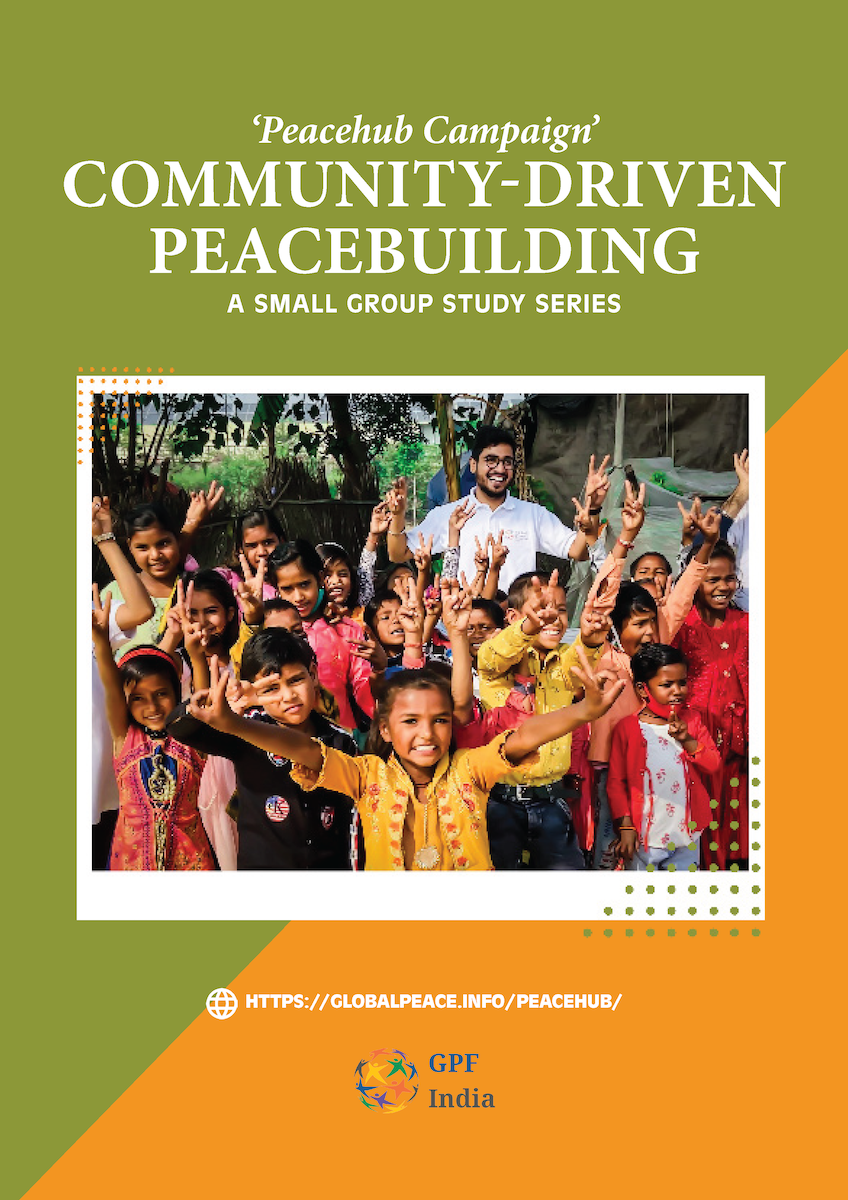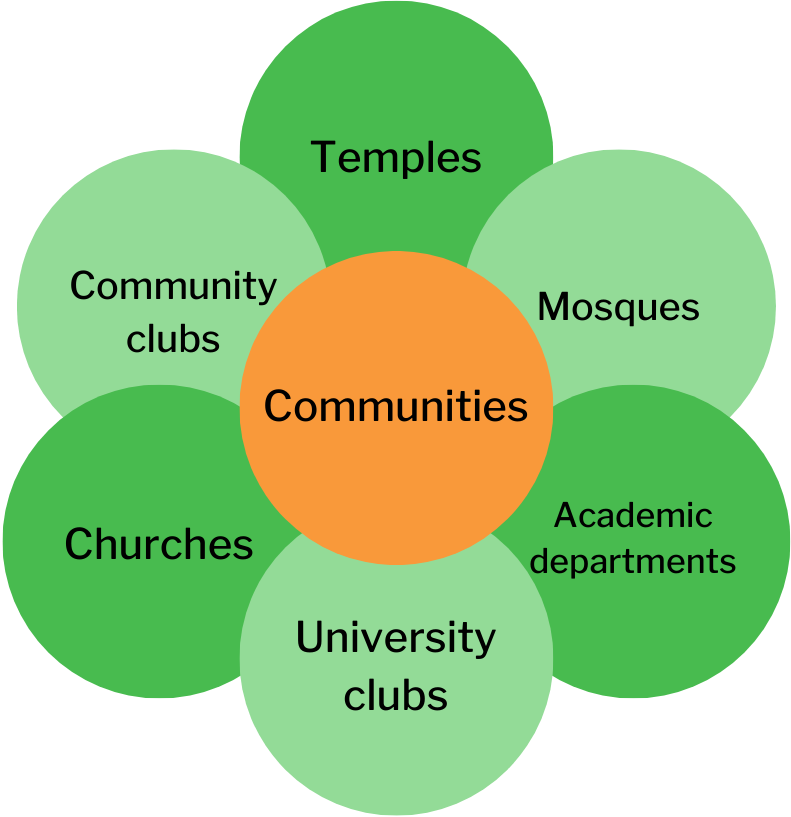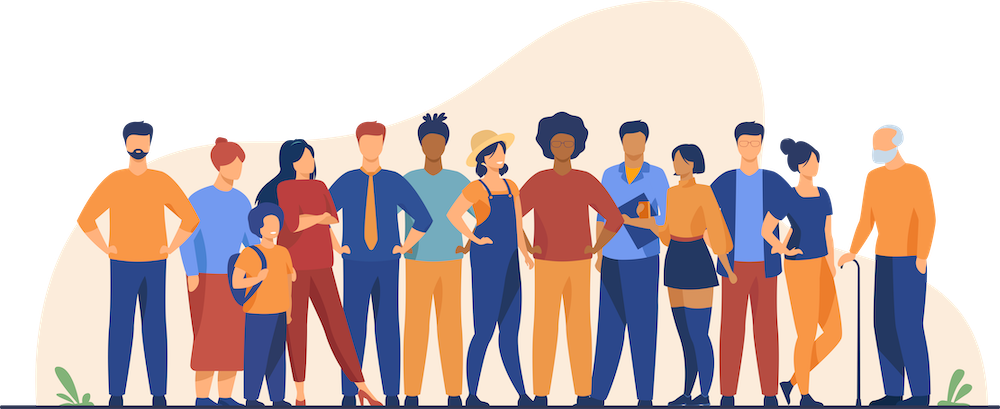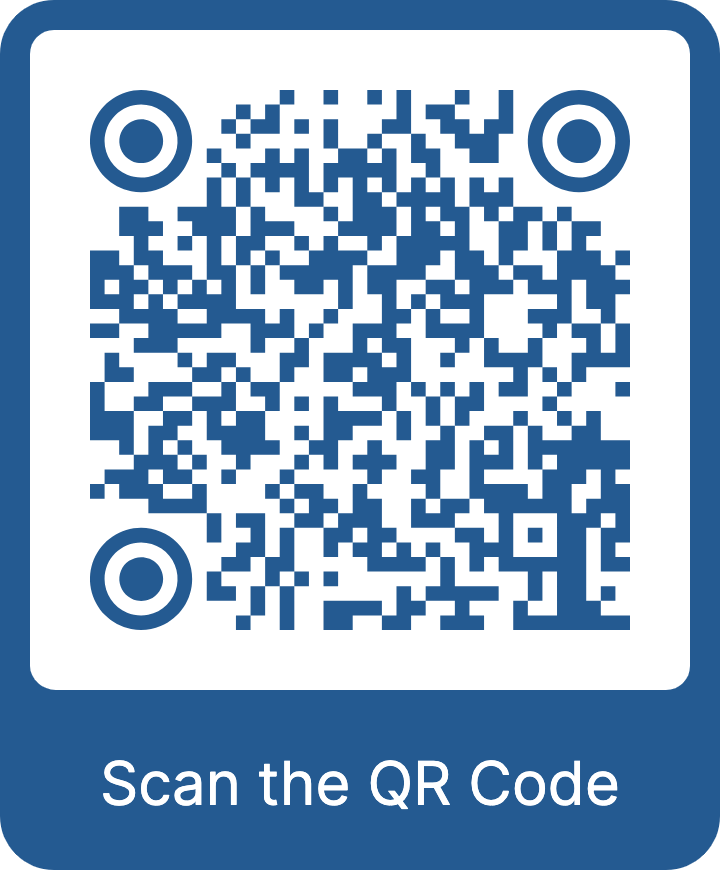your community can become a Peacehub today!
Governments, treaties, and diplomacy do not remove resentments, they do not address the final step of establishing lasting peace. How do you remove hatred from the human heart? How does one help those on either side who have been wronged or victimized to forgive?
Global Peace Foundation is doing the work of peacebuilding, which is necessary before the breakout of violence as a means of prevention; during the conflict to attempt to contain the violence; and after a conflict to create sustainable social cohesion.
This is education or training that is desperately needed in our communities today. We need to cultivate a deep longing, a desire, vision, and understanding of peace, peace in our hearts, in our families, our neighborhoods, in our communities, and in our nations; then, and only then, can we make peace a reality.
This PeaceHub Study Series workbook uses the “small group” methodology, a highly interactive system of education and outreach. You will notice on the cover of the workbook a reference to the “small group study series.”
Typically, the small group plan involves multiple sessions (the Community-Driven Peacebuilding study series is four sessions) that focus on a theme. This of course requires a weekly commitment of time and effort; it is this exact element that binds the group together and forms a meaningful and trustful bond between those participants within the group.
The four sessions collected within this workbook are focused on the mindset and work of peacebuilding on a grassroots level. Throughout history, peacemaking has been the purview of diplomats, yet today the role of civil society in peacebuilding has gained increased recognition for its efficacy and efficiency. It is time to go to the next level, for peacebuilding to happen on the grassroots, civil-society levels to gradually work to include communities and families in the same.

How It Works

- Introductory meetings with the leadership of the community to generate involvement
- The community works through the self-directed Study Series education within its own unique approaches, including study groups, men’s groups, youth groups, women’s groups, and full community gatherings.
- Designate a “PeaceHub Liason” for the community to connect with the GPF India office in New Delhi
- Training completion: in agreement with the phrase, “Think Globally, Act Locally”, each individual gets a certificate of completion “I am a Peacebuilder”
- Option to work with a nearby diverse community and repeat the study, completing a “Community Mapping exercise” and designing a service project together.
Session 1: Understanding Peace in the 21st Century
In our world today there are three main approaches or dimensions of peace. Unlike peacekeeping or peacemaking, which typically involve military and diplomatic efforts to end conflict, peacebuilding is an ongoing process of addressing the root causes of conflict and bringing reconciliation and forgiveness through full acknowledgement of shared human aspirations.
Session one examines the impact of rapid change and globalization, particularly the growing interchange among diverse peoples and cultures over the last century. Most conflicts the world over can be seen from the lens of, “us vs. them” identity conflict. This mentality divides us, keeps us apart, and subsequently directly contributes to war, conflict, and corruption. And by destroying opportunities to share and collaborate, this mindset continues a vicious cycle of underdevelopment, poverty, environmental degradation and more. The most pressing challenge today is finding common ground in our shared “human identity” and developing an ethical awareness that all people belong to one human family.

Session 2: Our Shared Humanity
History has shown that, despite best efforts, political and economic strategies have repeatedly failed to truly resolve identity-based conflicts. We need to develop alternative approaches as a way out of this quagmire such as aligning with the principle of “Vasudhaiva Kutumbkam” which resonates deeply within India’s multicultural and diverse society.
Many cultures have similar ethical frameworks that have served as the underpinning of building inclusive and peaceful societies. These ideals are similarly expressed in the African ethos of “Ubuntu,” the Indonesian ethic of “Pancasila,” and the ancient Korean ideal of “Hongik Ingan” among others and encapsulated in the expression that we are all one family under God.
Religious and wisdom traditions have both unique insights into transcendent truths and shared values and codes of conduct that provide practical guidance on daily life and fostering peace in society. Session II explores the importance of this “civic” mission and finding common ground in shared values as a basic for peace.

Session 3: Successful Models of Community Peacebuilding and the Art of Dialogue
The human family is a group that we all belong to, and just as we value unique characteristics and gifts among immediate family members, so the diversity of the human family can be an enriching source of strength and a basis for mutual respect and peace. The Global Peace Foundation has applied this vision of the human family to reconcile animosities among Christian and Muslim peoples in conflict zones in Nigeria through its One Family under God campaign.
This beginning of Session 3 explores what is possible when people come together based on a shared vision, principles and values.
The remainder of this Session focuses on the art of dialogue and the approaches to peacebuilding. Motivation is emphasized, and a change of heart as more significant than facts, logic and information in peacebuilding. Motivation derives from personal values, which ultimately guide attitudes and behavior. Recognition of shared values across cultures and religions is thus essential in guiding attitudes and behavior in diverse societies.

Session 4: Think Globally, Act Locally
Session 4 examines the significance of a Global Ethic as the basis for dialogue and cooperation among religions, communities, and society. How can we encourage a consensus on globally shared values, which is similar in nature to the concept of the “Global Ethic”? The Global Ethic is not a new idea; it has an interesting history and a direct connection to India. The session provides some background that includes the inspirational catalyst of Swami Vivekananda and the original formulation of a Global Ethic by theologian Hans Küng at the 1993 Parliament of World Religions in Chicago. The session looks closely at the values that are shared across religious traditions and the importance of building dialogue and cooperation to advance the acceptance of a Global Ethic to foster peace in a diverse world.
One proven way to become aware of our “shared identity” is through service or volunteering. Do we naturally feel empathy towards someone who is suffering and who looks very different than we do, speaks a different language, or has different perspectives on real life issues? Doing service and volunteering is a concrete way to grow our emotional sense of belonging to another group and to the larger human family.

Session Videos Available
In your group study, after introducing the topic, having an “ice-breaker” discussion and reading the quotations, now your group is ready to watch the film together. The group will be gathered around the nearest viewable television or computer screen. For a larger group, the video can be projected onto a larger screen. Just click on the arrow and expand to full screen viewing to watch online, or you can download the video prior to the meeting to avoid any possibility of connectivity issues. (The transcripts of the narration are in the back of the booklet for further study.)
Here are the resources needed for the Group Activities and Individual study in Session III and Session IV.
- 10 Principles of Dialogue by Leonard Swidler
- Universal Declaration of a Global Ethic by Leonard Swidler
- Declaration of a Global Ethic by Hans Küng
- Dr. Swidler’s presentation on the Global Ethic at the Global Peace Convention 2017 in Manila, the Philippines
Join the New Delhi Declaration Campaign
On April 13th 2023, the New Delhi Declaration was presented and signed by the Global Peace Leadership Conference attendees in person and virtually. The Declaration highlights “the strength of a united humanity to inspire civil societies to take up the task of healing the world and propagating greater consciousness of shared human welfare, of Creation, and of God.”
The Declaration’s specific action items included:
- launching a Peace Hubs campaign and youth-led Peace Clubs to empower youth leadership;
- supporting a lifestyle of Seva (service) to others to further a global peace and service corps alliance to addressing challenges of poverty, the environment, and other key 2030 Sustainable Development Goals;
- undertaking specific university and secondary school initiatives to inculcate the ethical and moral values of compassion, creativity, and integrity;
- fostering partnerships with civil society organizations to create a global coalition working towards a shared vision for peace and prosperity, education, and environmental conservation in furtherance of C20 policy recommendations; and
- developing strategies to upscale grassroots environmental conservation initiatives supported internationally.
The signed declaration will be presented to the Civil 20 India 2023 and the G20, which will be hosted in India in September.
Be part of a movement that uplifts human consciousness and peace for achieving the goal of One Earth, One Family and One Future.

